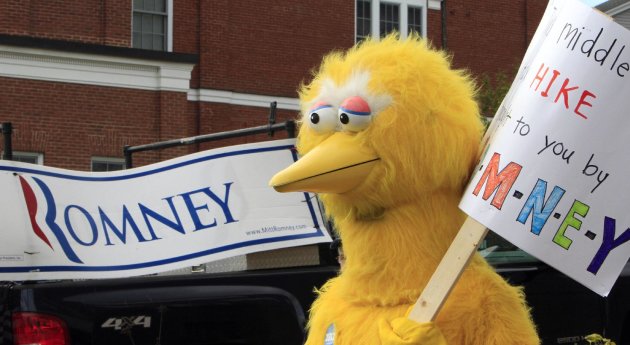
Big Bird is flying high in the 2012 presidential campaign.
The foundation backing "Sesame Street" quickly disavowed the spot, and Romney dismissed it as un-serious even though the Republican hopeful brought Big Bird into the national political conversation at last week's presidential debate.
Big Bird has been a big deal since Romney, in outlining ways he would cut federal spending, said, "I'm going to stop the subsidy to PBS," adding, "I like PBS, I love Big Bird."
Romney's vow to de-fund public broadcasting has been a staple of his campaign appearances for months, but the nationally televised declaration last week in Denver — more than 67 million were watching — gave it a much broader audience than ever before.
Romney's comment drew immediate reaction on social media, with users posting online photos of Big Bird appearing down on his luck or searching for work. Mock Big Birds have followed Romney to campaign events, and the real Big Bird even made an appearance on "Saturday Night Live" last weekend.
"I feel like I'm famous now. I was walking down the street the other day and felt like everyone recognized me," Big Bird said.
The "Sesame Street" dis offered an opening to Obama, who has faced strong backlash for his widely panned debate performance. At rallies and campaign appearances every day since the debate, he has used Romney's remark and referenced other "Sesame Street" characters to mock his opponent in a way audiences find funny and relatable.
"He said he'd bring down our deficit by going after what has been the biggest driver of our debt and deficits over the last decade — public television, PBS," Obama told people at a fundraiser Monday in San Francisco. "Elmo has been seen in a white Suburban. He's driving for the border. Oscar is hiding out in his trashcan. We're cracking down on them."
The satiric Obama campaign ad, set to air on national broadcast and cable stations, echoes that theme. The ad shows images of convicted financiers including Bernie Madoff and Enron's Ken Lay, and suggests Romney believes Big Bird is responsible for their crimes.
"Big, yellow, a menace to our economy," the ad says. "Mitt Romney knows it's not Wall Street you have to worry about, it's Sesame Street."
While Romney's comment drew criticism from PBS the day after the debate, the Sesame Workshop, which supports "Sesame Street" and other public broadcasting shows, demanded that Obama's campaign remove the ad.
"Sesame Workshop is a nonpartisan, nonprofit organization and we do not endorse candidates or participate in political campaigns," the organization said in a terse, two-sentence statement. "We have approved no campaign ads and, as is our general practice, have requested that the ad be taken down."
Obama campaign spokesman Ben LaBolt said the campaign was reviewing the organization's concerns.
Romney, campaigning in Iowa, dismissed the Big Bird ad as inconsequential and suggested Obama was focusing on trivial matters rather than the economy and high unemployment.
"These are tough times with real serious issues, so you have to scratch your head when the president spends the last week talking about saving Big Bird." Romney told a cheering crowd. "I actually think we need to have a president who talks about saving the American people and saving good jobs and saving our future."
With his newfound political celebrity, Big Bird has emerged as the latest star in a campaign proxy war over a larger policy issue.
In 2008, Joe Wurzelbacher, or "Joe the Plumber," set off a proxy battle over tax policy when he asked Obama about his tax plan for small business. Obama's videotaped reply, in which he told Wurzelbacher that "when you spread the wealth around, it's good for everybody," prompted Republican John McCain to seize the statement as evidence that Obama supported socialist tax policies. Obama doubled down on his argument that higher income earners should be taxed more than the middle class.
This year, Big Bird is serving as a central actor in the debate over federal spending in tough economic times.
Public broadcasting has long drawn the scorn of many conservatives who see it as wasteful and having a liberal bias. Romney has framed it as a fiscal issue, suggesting shows like "Sesame Street" should charge for advertising like other television stations and shouldn't depend on the federal government for support.
Obama, for his part, has tried to frame the controversy as a matter of conservative overreach, suggesting that Romney and others would cut funding for much-beloved children's programming while giving tax breaks to the wealthy.
PBS receives a portion of its funding from the Corporation for Public Broadcasting, which receives an annual appropriation from Congress. In 2012, CPB received $445 million in federal funding. PBS said in a news release after last week's presidential debate that public broadcasting receives about one-100th of 1 percent of the federal budget.

No comments:
Post a Comment